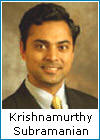The Centre for Analytical
Finance (CAF) at the Indian School of Business (ISB) hosted the
Summer Research Conference 2007, during August 9-12, 2007. The theme
of the Conference was - 'Recent Advances in Corporate Finance'. The
purpose of the Conference was to serve as a platform for an exchange
of ideas between the best financial researchers across the globe on
some of the most important topics in corporate financing.
The Conference attracted a total of hundred research papers
submitted by finance scholars around the world, out of which sixteen
were selected. The criteria, as always, were originality of topic
and innovative approach. The number as well as the high quality of
submissions resulted in keen competition for selection. All accepted
papers went through several rounds of reviewing: an initial round
for appropriateness and quality and a final round when they were
ranked against each other. The final reviewing committee included
twenty world-wide experts, including the likes of Franklin Allen
(Wharton), Bhagwan Chowdhry (UCLA), Stijn Claessens (IMF), and
Francesca Cornelli (London Business School).
The Keynote Address
Professor Raghuram Rajan delivered the Keynote Address on Foreign
Capital and Economic Growth in Developing Countries: Issues and
Challenges. Professor Rajan is currently Eric J. Gleacher
Distinguished Service Professor of Finance, Graduate School of
Business, University of Chicago. Until recently, he was the Economic
Counsellor and Director of Research at the International Monetary
Fund - the first and youngest finance researcher to hold this very
influential research position. Professor Rajan was the first Area
Leader in Finance, during ISB’s formative years and had drafted the
concept note on the CAF, playing a key role in its set up.
In his address Professor Rajan highlighted facts like:
-
Capital is not flowing more
to poor countries over time as they improve their financial
systems. In fact, flow is reversing in recent times.
-
Non-industrial countries
that have utilized the most foreign capital, have tended to grow
more slowly.
-
For non-industrial
countries, given a level of investment, the more it is financed
through domestic savings, the higher the associated growth is.
-
Foreign capital usage is
negatively correlated with growth.
-
Countries are more likely
to grow if they consume less and save more during growth spurts.
The following were
some conclusions drawn:
Foreign capital, as a form of net financing, does not play much of a
role in the growth of non-industrial countries, while it does play a
role in industrial countries because -
-
Non-industrial countries
may have limited ability to absorb it.
-
Financial sector may not be
able to allocate arm’s length capital.
-
Countries may be more prone
to exchange rate overvaluation.
This does not necessarily mean
countries should close themselves to capital flows – foreign capital
could play a role in enhancing absorptive capacity. It does suggest,
though, a greater focus on enhancing absorptive capacity, enhancing
the capacity of the domestic financial system and enhancing other
forms of domestic capacity – e.g. domestic savings and domestic
human capital
Citigroup Awards
 A
USD 5,000 award was generously funded by Citigroup for the best
paper presented at the conference. The award went to Viral V Acharya
(London Business School and CEPR) and Krishnamurthy Subramanian
(Emory University) for their paper entitled Bankruptcy Codes
and Innovation. The paper posed the question-‘Do legal
institutions governing financial contracts affect the nature of real
investments in
the economy?’ A
USD 5,000 award was generously funded by Citigroup for the best
paper presented at the conference. The award went to Viral V Acharya
(London Business School and CEPR) and Krishnamurthy Subramanian
(Emory University) for their paper entitled Bankruptcy Codes
and Innovation. The paper posed the question-‘Do legal
institutions governing financial contracts affect the nature of real
investments in
the economy?’

The authors presented a simple model and provided evidence that the
answer to this question is ‘yes’. Bankruptcy codes in different
countries play a central role in determining whether the firm is
continued or liquidated in case of financial distress. When the code
is creditor-friendly, excessive liquidations cause the firms to shy
away from innovations. In contrast, by promoting continuation upon
failure, a debtor-friendly code induces greater innovation.
For more information on the CAF Summer Research Conference 2007,
please visit:
http://www.isb.edu/PostSummerResearchConference/Index.html
Contributions are invited
for the October 2007 issue of Alma Matters. Please send in information on any
events that have taken place or are being planned in your chapter as well as
personal milestones that you would like to share with the ISB alumni community
to
Smita_Hopper@isb.eduedu |






